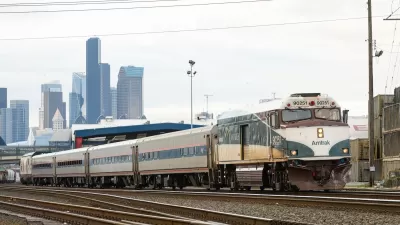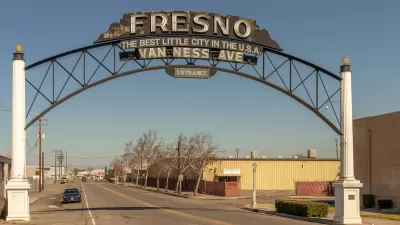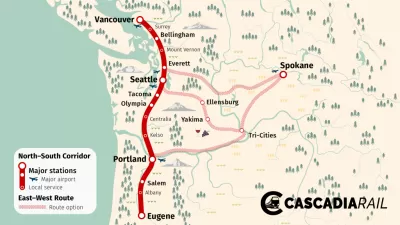High Country News reports on Fresno's infamous Taco Flat in this 4-pager. Seattle's Nickelsville and Portland's Dignity Village are held up as better examples of squatter settlements. Architecture and 'informal urbanism' of tent cities is examined.
"Tent cities have much in common with the squatter camps of the Great Depression, but to simply call them Hoover-villes is to ignore their complexity. To truly understand them, one must look at current trends in the developing world, where informal urbanism -- a form of "slum" development that takes place outside the conventions of city planning -- is now the predominant mode of city-making.
Informal urbanism, characterized by unauthorized land occupation, makeshift construction and a lack of public utilities, is how many burgeoning nations meet their housing needs. It thrives in places like Fresno, where poverty is endemic and there is a wide gap between rich and poor.
Fresno, which the Brookings Institution ranked in 2005 as the American city with the greatest concentration of poverty, is far from the only place where people are resorting to life in makeshift abodes.
Rahul Mehrotra, a professor at the MIT Institute of Urban Studies and Planning, said there's a real kinship between Taco Flat and the squatter settlements of Mumbai, India, where he runs an architectural firm."
"It's really a reflection of the government's inability to provide housing affordably across society."
"The promise of tent cities begins with their architecture. Makeshift dwellings may not be the dream homes of yesteryear, but they are simple, affordable and sustainable in their use of salvaged materials. With imaginative designers, they could help solve the present housing crisis, a faster alternative to the lengthy process of building low-income apartment complexes and homeless shelters."
Thanks to Annie Dawid
FULL STORY: Tarp Nation: Squatter villages arise from the ashes of the West's booms and busts

Planetizen Federal Action Tracker
A weekly monitor of how Trump’s orders and actions are impacting planners and planning in America.

Map: Where Senate Republicans Want to Sell Your Public Lands
For public land advocates, the Senate Republicans’ proposal to sell millions of acres of public land in the West is “the biggest fight of their careers.”

Restaurant Patios Were a Pandemic Win — Why Were They so Hard to Keep?
Social distancing requirements and changes in travel patterns prompted cities to pilot new uses for street and sidewalk space. Then it got complicated.

Platform Pilsner: Vancouver Transit Agency Releases... a Beer?
TransLink will receive a portion of every sale of the four-pack.

Toronto Weighs Cheaper Transit, Parking Hikes for Major Events
Special event rates would take effect during large festivals, sports games and concerts to ‘discourage driving, manage congestion and free up space for transit.”

Berlin to Consider Car-Free Zone Larger Than Manhattan
The area bound by the 22-mile Ringbahn would still allow 12 uses of a private automobile per year per person, and several other exemptions.
Urban Design for Planners 1: Software Tools
This six-course series explores essential urban design concepts using open source software and equips planners with the tools they need to participate fully in the urban design process.
Planning for Universal Design
Learn the tools for implementing Universal Design in planning regulations.
Heyer Gruel & Associates PA
JM Goldson LLC
Custer County Colorado
City of Camden Redevelopment Agency
City of Astoria
Transportation Research & Education Center (TREC) at Portland State University
Camden Redevelopment Agency
City of Claremont
Municipality of Princeton (NJ)





























